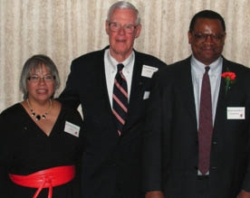Pro-life scientist honored at Citizens for Life dinner
CAMBRIDGE -- People are not hearing the truth about human embryonic stem-cell research even as politicians push to subsidize the grisly practice with both state and federal tax dollars.
The truth is that promising alternative research -- on adult stem cells -- is being conducted but largely ignored by the media and scientists intent on public funding of this research that requires killing human embryos.
That’s the assessment of Dr. James L. Sherley, a nationally recognized pro-life scientist who was honored at the Massachusetts Citizens for Life’s (MCFL) April 13 dinner for publicly voicing the often-ignored moral side of this issue. Sherley, 49, is the first and only black faculty member of Massachusetts Institute of Technology’s (MIT) biological engineering division.
“Scientists aren’t giving full and honest disclosure,” he said in a recent interview. “We’ve already found from adult cells how to address certain diseases and have not had to kill a single person to do this. Scientists know it’s unlikely embryonic stem-cell research will work. It’s a ploy to get more research funding.”
Sherley’s assessment has been echoed in recent pleas from pro-life advocates, the nation’s Catholic bishops and President George W. Bush.
Just as abortion is legal in the U.S., so is killing human embryos. The recent heated debate in Congress and on Beacon Hill has focused on who will pay for this research that has not produced one successful treatment.
Despite this fact, the U.S. Senate April 11 approved a bill that would authorize federal funding of it. The House approved a similar bill in January.
A conference committee will send a final version to Bush, who said April 12 that he would veto the bill. His veto could prevail as neither the House nor Senate approved it with margins wide enough for an override. Bush said it “crosses a moral line that I and many others find troubling.”
New studies over the last three weeks indicated that adult stem cells have shown promise in treating diseases from Type 1 diabetes to heart damage. According to the Washington D.C.-based Family Research Council, adult stem cells have shown success in treating 72 different diseases and injuries.
Sherley’s own research focuses on adult stem cells -- discovering the intricate machinery they use to divide, and harnessing this machinery to coax adult stem cells to grow better in laboratory conditions. In 2006 he won a prestigious Pioneer Award from the National Institutes of Health, a $2.5 million grant for scientists taking innovative approaches to biomedical problems.
The rush to use embryonic stem cells is not based on ignorance of the fact that human life begins at the stage of a single cell, Sherley said. The problem is disregard for its value.
And the issue gets further clouded when politicians and the media don’t specify what kind of stem-cell research they’re talking about. “I’m concerned with how information is being disseminated without making distinctions,” Sherley said.
All four Massachusetts bishops voiced similar concern April 6 about the dangerous moral freefall implied in Gov. Deval Patrick’s March 30 announcement that he plans to dismantle state restrictions on embryonic stem-cell research put in place by former Gov. Mitt Romney.
The Massachusetts Legislature in 2005 actually legalized human cloning (calling it “somatic cell nuclear transfer”) for embryonic stem-cell research. But Romney’s regulations still banned scientists from setting up embryo “farms” or from importing stem-cell lines from other states that allow them.
Yet in news reports, Patrick stressed global competition and ignored the moral implications involved.
MCFL executive director Marie Sturgis said in reaction, “We’re appalled. These are human beings. Science should be guided by ethics and morals.”
Cardinal Seán P. O’Malley wrote in his online blog April 6: “When the media promote embryonic stem-cell research, they often give the impression that those who oppose it are some sort of religious fanatics ... In actuality, the scientific cures are coming about through the ethical ways of doing things.”
Research on adult stem cells and those from umbilical-cord blood or placenta or bone marrow is fine because no harm is done to the donor, points out Father Tadeusz Pacholczyk, education director for the National Catholic Bioethics Center. Only research using embryonic stem cells raises “insuperable moral objections” as it sanctions the direct exploitation and destruction of one person by another.
Exploitation -- whether of the unborn or because of race -- is a violation of basic human rights, Sherley noted. He made national news earlier this year when he staged an 11-day hunger strike at MIT in a dispute over his being denied tenure, a move he said was a combination of prejudices against his race and his opposition to embryonic stem-cell research.
MIT officials disputed his claims, but did acknowledge that minorities are under-represented on the faculty, launched a review of employment practices, and agreed to further talks with Sherley.
“Blacks and other minorities should pay attention to these life issues, because if we continue to move in the direction we’re going, it will be those populations who will be most affected,” Sherley said. Although blacks comprise only 12-15 percent of the U.S. population, a disproportionate 37 percent of all babies aborted are black.
Embryonic stem-cell research will require massive donations of women’s eggs, exploiting women’s bodies as raw material for experiments, according to Catholic Citizenship, a Boston-based lay-run group that encourages Catholics to participate in the legislative process.
Catholic Citizenship has urged people to oppose both federal and state funding of the embryonic stem-cell research by contacting their elected officials.



















